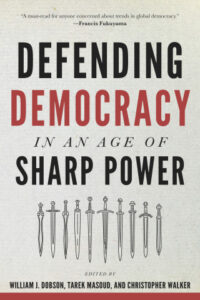Liberal democracy is losing steam, say analysts Ayisha Osori, the Director, Ideas and Fellowship Collaborative at the Open Society Foundation (OSF). Udo Jude Ilo, the Interim Executive Director at the Center for Civilians in Conflict (CIVIC). With the recent coup in Gabon, Africa celebrated the ignoble milestone of 109 successful coups on the continent. A third of Europeans are voting for populist, anti-establishment parties and political parties are failing across Latin America from the weight of populists winning elections, they write for African Arguments:
The axis of authoritarianism is expanding and solidarity amongst authoritarian states is flourishing as they develop a shared lexicon around decolonization, anti-elitism, security, prosperity, patriotism, and sovereignty. …We need to design more inclusive language and ideologies for democracy. The growing toxicity of politics and elections; the personal benefits of state capture; a world order built on exploitation; and the demonization of the other all cripple the practice of democracy and undermines global stability.
 Recent studies make crystal-clear that it is elites, not the “masses,” who destroy democracies, according to a prominent expert. Ever since the heyday of mass psychology in the nineteenth century, “ordinary people” have been regarded as irrational and highly susceptible to the blandishments of aspiring demagogues. But in fact, elites are the variable in the equation, notes Jan-Werner Mueller, Professor of Politics at Princeton University, and the author, most recently, of Democracy Rules.
Recent studies make crystal-clear that it is elites, not the “masses,” who destroy democracies, according to a prominent expert. Ever since the heyday of mass psychology in the nineteenth century, “ordinary people” have been regarded as irrational and highly susceptible to the blandishments of aspiring demagogues. But in fact, elites are the variable in the equation, notes Jan-Werner Mueller, Professor of Politics at Princeton University, and the author, most recently, of Democracy Rules.
If demagogues get an opportunity to capture democratic institutions, they can often do so without resistance from the citizenry. As Larry M. Bartels observes in Democracy Erodes From the Top: Leaders, Citizens, and the Challenge of Populism in Europe, there is plenty of social-scientific evidence demonstrating that people are reluctant to punish politicians for anti-democratic behavior if doing so runs against their own party or policy preferences.
As such, almost everything depends on elites, and specifically on what political scientist [and Journal of Democracy contributor] Nancy Bermeo calls “distancing capacity,” meaning their willingness to take a broader view and prioritize democracy over immediate political or personal benefits, he writes for Project Syndicate:
Bartels has identified a reservoir of voters on which both far-right and opportunistic center-right politicians can draw. But these voters are a loud minority, not the silent majority. They are hardly capable of becoming an unstoppable wave that will sweep over the world’s democracies. To create that impression, they need the complicity of elites who ought to know better.
 Popular media, entertainment industries, universities, the tech world, and even critical political institutions are being manipulated by dictators who advance their regimes’ interests by weakening democracies from within, according to a new analysis.
Popular media, entertainment industries, universities, the tech world, and even critical political institutions are being manipulated by dictators who advance their regimes’ interests by weakening democracies from within, according to a new analysis.
Autocrats’ use of “sharp power” constitutes one of the gravest threats to liberal, representative government today, say the contributors to Defending Democracy in an Age of Sharp Power, edited by William J. Dobson, Tarek Masoud, and Christopher Walker. The optimistic, early twenty-first-century narrative of how globalization, the spread of the internet, and the rise of social media would lead to liberalization everywhere is now giving way to the realization that these same forces provide inroads to those wishing to snuff out democracy at the source.
The book was the subject of a recent discussion at the National Endowment for Democracy’s International Forum (above).







